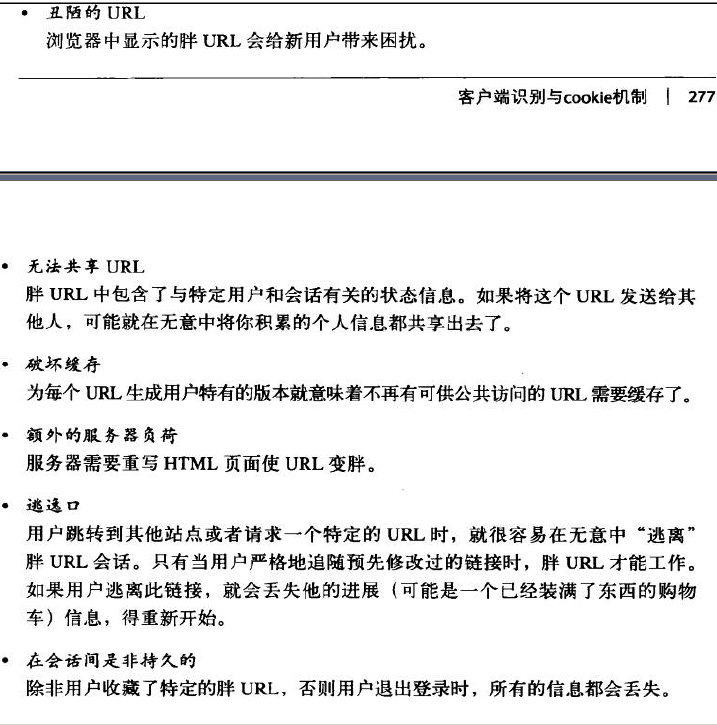Fat URLs Client Identification

w在每个URL后面都附加一个用户特有的标识码。
HTTP The Definitive Guide
Some web sites keep track of user identity by generating special versions of each URL for each user.
Typically, a real URL is extended by adding some state information to the start or end of the URL
path. As the user browses the site, the web server dynamically generates hyperlinks that continue to
maintain the state information in the URLs.
URLs modified to include user state information are called fat URLs. The following are some example
fat URLs used in the Amazon.com e-commerce web site. Each URL is suffixed by a user-unique
identification number (002-1145265-8016838, in this case) that helps track a user as she browses the
store.
...
<a href="/exec/obidos/tg/browse/-/229220/ref=gr_gifts/002-
1145265-8016838">All
Gifts</a><br>
<a href="/exec/obidos/wishlist/ref=gr_pl1_/002-1145265-
8016838">Wish List</a><br>
...
<a href="http://s1.amazon.com/exec/varzea/tg/armed-forces/-
//ref=gr_af_/002-1145265-
8016838">Salute Our Troops</a><br>
<a href="/exec/obidos/tg/browse/-/749188/ref=gr_p4_/002-
1145265-8016838">Free
Shipping</a><br>
<a href="/exec/obidos/tg/browse/-/468532/ref=gr_returns/002-
1145265-8016838">Easy
Returns</a>
...
You can use fat URLs to tie the independent HTTP transactions with a web server into a single
"session" or "visit." The first time a user visits the web site, a unique ID is generated, it is added to the
URL in a server-recognizable way, and the server redirects the client to this fat URL. Whenever the
server gets a request for a fat URL, it can look up any incremental state associated with that user ID
(shopping carts, profiles, etc.), and it rewrites all outgoing hyperlinks to make them fat, to maintain
the user ID.
Fat URLs can be used to identify users as they browse a site. But this technology does have several
serious problems. Some of these problems include:
Ugly URLs
The fat URLs displayed in the browser are confusing for new users.
Can't share URLs
The fat URLs contain state information about a particular user and session. If you mail that
URL to someone else, you may inadvertently be sharing your accumulated personal
information.
Breaks caching
Generating user-specific versions of each URL means that there are no longer commonly
accessed URLs to cache.
Extra server load
The server needs to rewrite HTML pages to fatten the URLs.
Escape hatches
It is too easy for a user to accidentally "escape" from the fat URL session by jumping to
another site or by requesting a particular URL. Fat URLs work only if the user strictly follows
the premodified links. If the user escapes, he may lose his progress (perhaps a filled shopping
cart) and will have to start again.
Not persistent across sessions
All information is lost when the user logs out, unless he bookmarks the particular fat URL.




